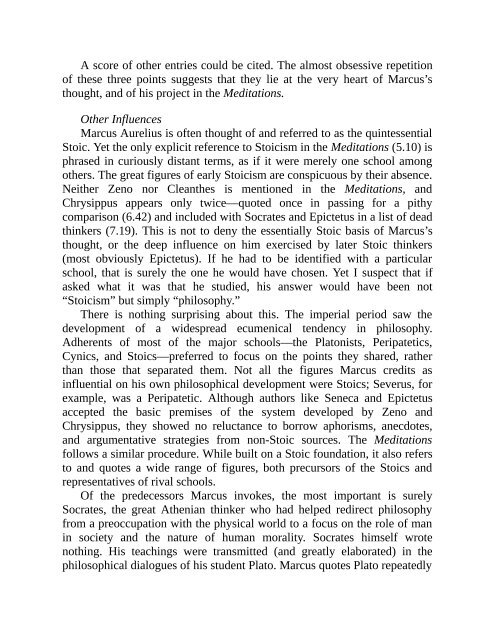9781945186240
Create successful ePaper yourself
Turn your PDF publications into a flip-book with our unique Google optimized e-Paper software.
A score of other entries could be cited. The almost obsessive repetition<br />
of these three points suggests that they lie at the very heart of Marcus’s<br />
thought, and of his project in the Meditations.<br />
Other Influences<br />
Marcus Aurelius is often thought of and referred to as the quintessential<br />
Stoic. Yet the only explicit reference to Stoicism in the Meditations (5.10) is<br />
phrased in curiously distant terms, as if it were merely one school among<br />
others. The great figures of early Stoicism are conspicuous by their absence.<br />
Neither Zeno nor Cleanthes is mentioned in the Meditations, and<br />
Chrysippus appears only twice—quoted once in passing for a pithy<br />
comparison (6.42) and included with Socrates and Epictetus in a list of dead<br />
thinkers (7.19). This is not to deny the essentially Stoic basis of Marcus’s<br />
thought, or the deep influence on him exercised by later Stoic thinkers<br />
(most obviously Epictetus). If he had to be identified with a particular<br />
school, that is surely the one he would have chosen. Yet I suspect that if<br />
asked what it was that he studied, his answer would have been not<br />
“Stoicism” but simply “philosophy.”<br />
There is nothing surprising about this. The imperial period saw the<br />
development of a widespread ecumenical tendency in philosophy.<br />
Adherents of most of the major schools—the Platonists, Peripatetics,<br />
Cynics, and Stoics—preferred to focus on the points they shared, rather<br />
than those that separated them. Not all the figures Marcus credits as<br />
influential on his own philosophical development were Stoics; Severus, for<br />
example, was a Peripatetic. Although authors like Seneca and Epictetus<br />
accepted the basic premises of the system developed by Zeno and<br />
Chrysippus, they showed no reluctance to borrow aphorisms, anecdotes,<br />
and argumentative strategies from non-Stoic sources. The Meditations<br />
follows a similar procedure. While built on a Stoic foundation, it also refers<br />
to and quotes a wide range of figures, both precursors of the Stoics and<br />
representatives of rival schools.<br />
Of the predecessors Marcus invokes, the most important is surely<br />
Socrates, the great Athenian thinker who had helped redirect philosophy<br />
from a preoccupation with the physical world to a focus on the role of man<br />
in society and the nature of human morality. Socrates himself wrote<br />
nothing. His teachings were transmitted (and greatly elaborated) in the<br />
philosophical dialogues of his student Plato. Marcus quotes Plato repeatedly


